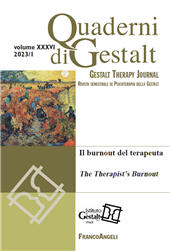Postfazione del libro di Erving Polster : "L'incanto per la psicoterapia della Gestalt. Accompagnarsi nell'esplorazione della vita"
79-89 p.
Attraversando la linea evolutiva delle pubblicazioni di Erving Polster, uno degli psicotera-peuti più stimati in campo mondiale e uno degli autori più significativi della Gestalt Therapy, emerge come nei suoi scritti abbia girato attorno ad alcuni concetti fondamentali facendone venir fuori aspetti sempre nuovi, che potrebbero essere riassunti in tre: il fascino, il nowfo next e i life focus groups. La curiosità estetica, l'interesse, il fascino, verso le relazioni umane che lo ha sempre caratterizzato dà forza, in questa sua pubblicazione di cui l'articolo è la postfazione, a una prospettiva nuova, che rappresenta un passaggio epistemologico necessario in un mondo in cui una pandemia ci ha fatto capire quanto siamo biologicamente interconnessi e quanto nes-suno può salvarsi da solo: il cambiamento è generato dalla possibilità di sentire la magia dello stare insieme, dall'incanto che si crea tra le persone unite da un'esperienza comune. [Testo dell'editore].
The afterword to the book Enchantment and Gestalt Therapy. Partners in Exploring Life, by Erving Polster, one of the world's most respected psychotherapists, begins by going through the evolutionary line of his publications. Erving Polster is recognized as one of the most significant authors of Gestalt Therapy, in his writings he has always revolved around certain fundamental concepts while always bringing out new aspects, which could be summarized in three: fascination, now for next and life focus groups. To capture the making of expe-rience, Polster uses aesthetic registers, primarily fascination. His leitmotiv focuses on the mak-ing of experience in the here and now, the intentional charge that directs people in contact with each other (the now for next) and the self-regulating effect this has at the community level.
The aesthetic curiosity toward human relationships that has always characterized him empowers, in this publication, a new perspective that represents a necessary epistemological shift in a world in which a pandemic has made us realize how biologically interconnected we are and how no one can save himself alone: change is generated by the possibility of feeling the magic of being together, by the enchantment that is created among people united by a common experience. A narrative approach to synthesis was used to discuss the results of the articles (Popay et al., 2006). The adoption of this approach allowed the identification of some key themes related to the results. In fact, from the studies reviewed, some predictor variables of burnout emerged: the area of emotions including emotional over-identification, good emotional regulation, empathy, and self-compassion;.
in addition, in terms of protective factors, variables such as good resilience skills, adequate training during training, personal psychotherapy, and supervision emerged. Thus, even in the area of human relationships, we must shift the focus from the process of organism-environment contact (centered on the dyadic relationship) to the community process, understood as shared movement toward a common goal. This is the triumph of overcoming individualism, expressed through a book that generates action in the reader, not introjection. [Publisher's text].
-
Articoli dello stesso fascicolo (disponibili singolarmente)
-
Informazioni
Codice DOI: 10.3280/GEST2023-001006
ISSN: 2035-6994
MATERIE
PAROLE CHIAVE
- Incanto, gruppi, interconnessione, fenomenologia, sguardo estetico
- Enchantment, groups, interconnection, phenomenology, aesthetic gaze


